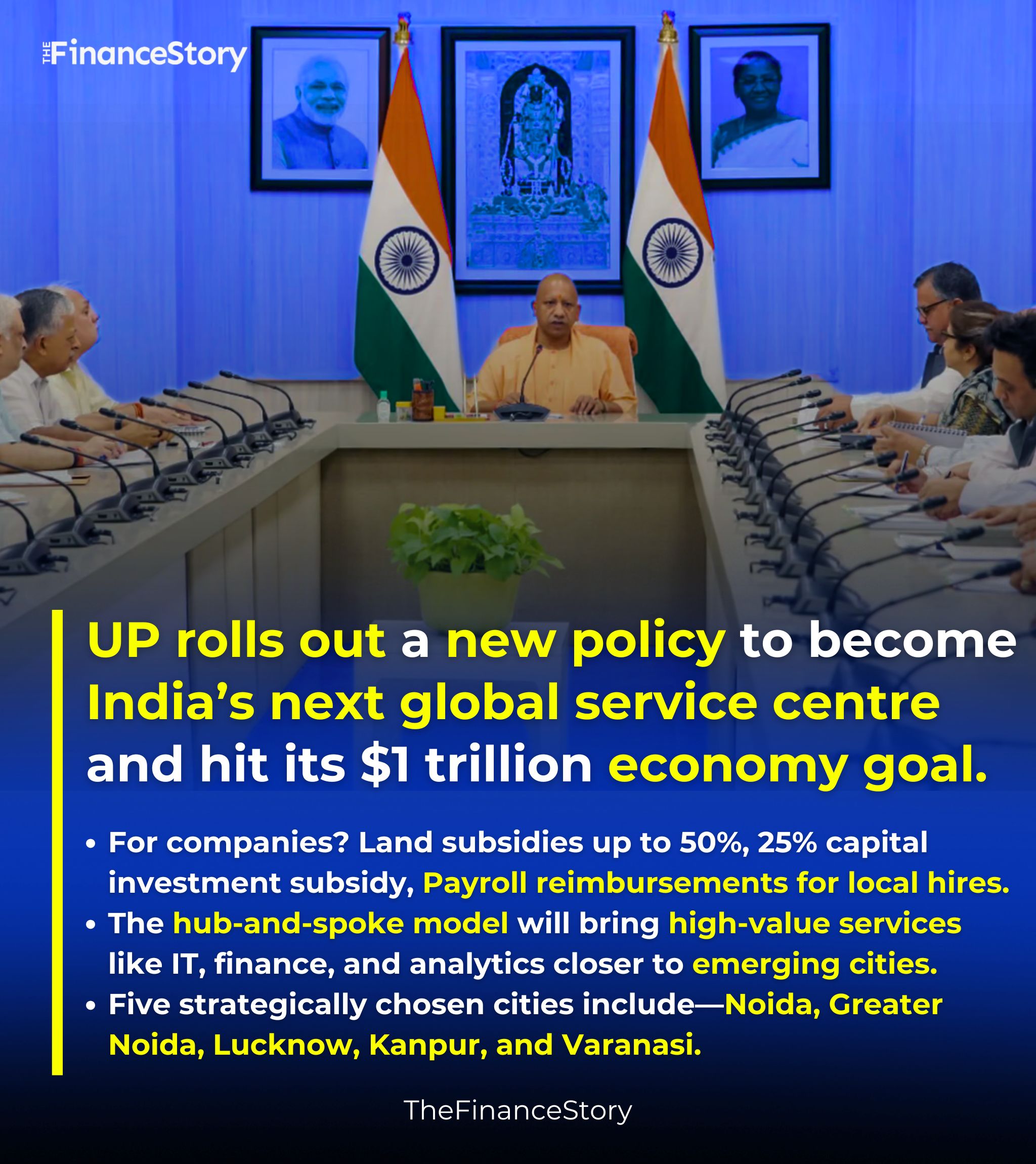-
The Uttar Pradesh government — passed a new Global Capability Centres (GCC) Policy on May 6.
- The policy was cleared during a cabinet meeting chaired by Chief Minister Yogi Adityanath.
-
The goal? Turn the state into India’s next global service hub!
-
And yes, it’s gunning for a $1-trillion economy (The Indian Express)
-
What’s on the table for GCCs?

UP rolls out its GCC Policy
India is looking to become an even stronger hub for Global Capability Centers (GCCs).
Several Indian states have already introduced dedicated GCC policies to attract multinational corporations with a range of incentives.
The latest to join the list? Uttar Pradesh—India’s most populous state, and now positioning itself as a rising contender in the global GCC landscape.
Five strategically chosen cities include:
- Noida
- Greater Noida
- Lucknow
- Kanpur
- Varanasi
Key Incentives offered by Uttar Pradesh to GCCs
To attract IT, banking, healthcare, engineering, and deep-tech giants, UP’s policy offers substantial benefits:
-
Operational Subsidy: 20% reimbursement on rent, electricity, bandwidth, and data services, with a support cap of ₹180 crore.
-
Land Subsidy: 30–50% subsidy on land purchased from state agencies or industrial development authorities.
-
Payroll Reimbursements:
-
₹1.8 lakh/year for local (UP-domiciled) employees
-
₹1.2 lakh/year for non-domiciled hires
-
Capped at ₹20 crore per company, for three years.
-
-
Freshers’ Hiring Incentive: ₹20,000 per fresher (UP-domiciled) recruited from in-state institutions—offered to companies hiring 30+ such candidates annually, for five years.
-
Capital Investment Support: 25% subsidy on eligible capital expenses.
-
Tax and Duty Exemptions: SGST reimbursements, stamp duty exemptions, and land cost reductions.
-
R&D Grants: Up to ₹10 crore for setting up Centres of Excellence, promoting innovation and academic partnerships under IIEPP-2022.
Also read: Odisha Future Hub For GCCs?
Sectors in focus
The policy is especially attractive for GCCs operating in high-tech and innovation-heavy domains:
-
Artificial Intelligence (AI)
-
Cloud Computing
-
Cybersecurity
-
Machine Learning
-
Automotive Design
-
Semiconductors
Momentum is already building in UP
It’s poised to attract large-scale investments from global giants in IT, banking, healthcare, engineering, and emerging tech.
And several Global firms are waiting on the sidelines:
-
Microsoft has laid the foundation for a 10,000-seat development center in Noida.
-
MAQ Software has launched a 3,000-seat engineering hub, further validating UP’s emergence as a service center of choice.
Other States with dedicated GCC Policies
India currently hosts over 1,700 GCCs, accounting for nearly 50% of the global GCC market, per Nasscom–EY estimates.
As states compete for a larger share of the pie, here’s how they stack up:
Karnataka: The Pioneer (2024–2029 Policy)
-
Hosts 500+ GCCs, with 35% of India’s GCC workforce.
-
Aims to add 500 more GCCs and 3.5 lakh jobs by 2029.
-
Incentives: Rental reimbursement, EPF contribution for new hires, electricity duty waiver, R&D support.
-
AI Focus: ₹100 crore innovation fund, AI CoE, AI Skilling Council.
Madhya Pradesh: Tier-2 Tech Powerhouse
-
Launched on 14 Feb 2025.
-
Targets 50+ GCCs and 37,000 direct jobs.
-
Offers: Capital investment support, R&D incentives, nodal execution agency (MPSeDC), and dedicated PIU.
-
Focus sectors: IT, Finance, HR, Cybersecurity, Advanced Analytics, AI.
Andhra Pradesh: GCC Policy 4.0 (2024–2029)
-
Announced on 7 Feb 2025.
-
Aims to become a global tech destination.
-
Offers: Operational & payroll subsidies, co-working & hybrid model support, skill dev initiatives, fast-track clearances.
-
Target sectors: IT, Healthcare, Engineering, Emerging Tech.
Gujarat: Ambitious GCC Vision (2025–2030)
-
Unveiled on 11 Feb 2025 at GIFT City, Gandhinagar.
-
Targets 250+ GCCs, ₹10,000 crore in investment, and 50,000 high-skilled jobs.
Highlights:
- Capex support up to ₹200 crore.
- Interest subsidy (7%) on term loans.
- Skill reimbursements: 75% for students, 50% for professionals.
- Infrastructure readiness: GIFT City, clusters in Ahmedabad, Surat, Vadodara.
Also read: KPMG GCC India leader unveils big shifts & billion-dollar opportunities
Wrapping up…
Uttar Pradesh’s new GCC policy is a bold and strategic bet—backed by tangible incentives and political will.
With Microsoft and other players already expanding, UP may soon join the ranks of GCC leaders like Karnataka and Telangana.
India’s GCC boom isn’t just about numbers—it’s about innovation, global integration, and economic transformation. And with more states stepping up, the race is only getting started.
FAQs
Why GCCs Are Central to India’s Global Strategy
Gone are the days when GCCs were synonymous with back-office operations. Today, they:
-
Drive AI/ML, data science, cybersecurity, and cloud innovation
-
Serve as centres of excellence for engineering, finance, supply chain, and digital transformation
-
Play a strategic role in global innovation roadmaps for Fortune 500 firms
According to Nasscom–EY, India’s GCCs will contribute $46 billion in value by 2030 and employ over 2 million professionals by 2026.
Do the Big 4 have GCCs in India?
Absolutely. All four Big 4 firms have large-scale GCCs across India:
-
Deloitte: Hyderabad, Bengaluru, Mumbai, Gurgaon
-
PwC: Kolkata, Bengaluru, Hyderabad, Gurgaon
-
EY (GDS): Kochi, Trivandrum, Bengaluru, Chennai, Gurgaon
-
KPMG: Bengaluru, Gurgaon, Pune, Hyderabad







